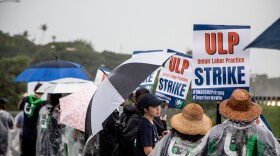Six years ago, Hawaiʻi's Department of Human Services said it would save nearly $30 million a year by not providing Medicaid coverage for so-called able-bodied Micronesians of working age.
DHS shifted that group to plans under the federal Affordable Care Act, but that turned out to be a middle-class solution for a community in poverty.
First, a look at the experiences of two local Micronesian patients.
Efania Miecho, 62, lives in Mayor Wright Housing in Kalihi. She is originally from Chuuk in Micronesia. Her children are grown. Her husband is unable to work. Her only earnings come from work as a caregiver to her mom.

Miecho’s medical issues range from kidney disease and high blood pressure to high cholesterol, gout, and general pain.
Five years ago, Miecho’s medical coverage was switched from Medicaid to the Affordable Care Act’s Marketplace. Through her translator Aritae Epeluk, she says the copayments were too much.
“I didn’t pay at my doctor visit because I cannot afford. I will have a lot of bills. It is difficult to pay on Marketplace. Every time I pick up prescriptions I had to pay the extra, like the copay," Miecho said.
Miecho decided to go without some of her medications — leaving her in poor health.
“I don’t have all my medication. If I don’t have the money, I would just forget it, I don’t get the other medication. Because I feel my body needed the pain reliever, that’s the only medication I would buy," she said.
Dr. David Derauf, executive director of Kōkua Kalihi Valley clinic, has a low-income Micronesian patient he’s been treating for years, whose health suffered when he lost Medicaid in 2015, and he couldn’t afford to pay for his prescriptions under the ACA.

“…a gentleman who suffers from severe rheumatoid arthritis. He’s in his late 40s. When his rheumatoid arthritis is not well-controlled — in order to have it well-controlled he actually requires three or four different medications — his knees are the size of jabong [tropical pomelo fruit, similar to grapefruit]. They’re huge, swollen, red, hot, painful knees — it’s painful just to look at them. And then he’s unable to walk and becomes disabled," Derauf said.
As a person who is disabled, he becomes eligible for Medicaid. But that coverage is temporary.
“When he gets back on his medication, his arthritis comes under control… he’s able to walk, and he goes back to work — at which point in time he’s no longer eligible for Medicaid. And you can imagine what a three-ring circus that is," Derauf told Hawaiʻi Public Radio.
“Our society is much better off if he’s a productive member of society and working and contributing and caring for his family — all of the things that someone whose health care is well-managed can do, and all of those things whose health is not can’t do.”
At the end of last year, Congress finally reinstated Medicaid coverage for Micronesians, after more than 20 years of legal and political battles.
In HPR's final report Thursday, HPR's Jackie Young will tell you how that happened — and what it means for the Micronesian population. Click here to read part one about nuclear radiation in Micronesia.






